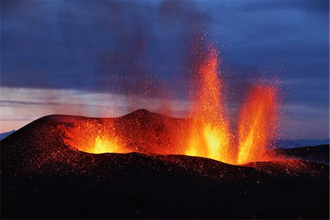An Angry Planet?
This decade has started off with a bang massive earthquakes in Haiti, Chile and China, a still-erupting volcano in Iceland and its neighboring volcano that some scientists speculate may erupt in the near future. Are these geologic events linked in some way, and should we be concerned that they are occurring more frequently?

Ash from Iceland's Eyjafjallajokull volcano has disrupted air travel this spring, but the eruptions are trivial on the scale of geologic trends, says Stephen Nelson, chair of earth and environmental sciences. (Photo from Masterfile)
According to Stephen Nelson, associate professor and chair of earth and environmental sciences at Tulane University, the tectonic activity that results in earthquakes and volcanic eruptions is a gradual process that plays out over hundreds of millions of years. In this time scale, any cluster of events that can be observed by humans is trivial and not predictive of significant geologic changes.
Regarding the spate of earth-shaking events that have occurred this year, Nelson suggests it can be chalked up to the randomness of nature.
“Just like hurricanes, sometimes there's more, sometimes there's less,” says Nelson. “The Earth goes through cycles, and I don't think we understand why, especially when it comes to earthquakes and volcanoes.”
Another factor accounting for the higher-than-average number of earthquakes this year is the extraordinary strength of the Chilean earthquake in February. Having a magnitude of 8.8, the quake was followed by a large number of aftershocks.
“If you look at the number of aftershocks, it distorts the numbers game because you have a whole lot of earthquakes related to this one event,” says Nelson.
Nelson, who teaches a course on natural disasters, says that if there is a take-home message from these random, destructive events, it's that “humans become complacent too quickly” after a disaster and do not take the appropriate action to mitigate losses in the future.
Whether it's the concrete construction in Haiti that proved so vulnerable to the shaking of the earth or the levees in New Orleans that provided such poor protection against the rising of the sea, “we just build stuff to satisfy the moment,” says Nelson. “Through foresight, we can do something to save lives and money.”
